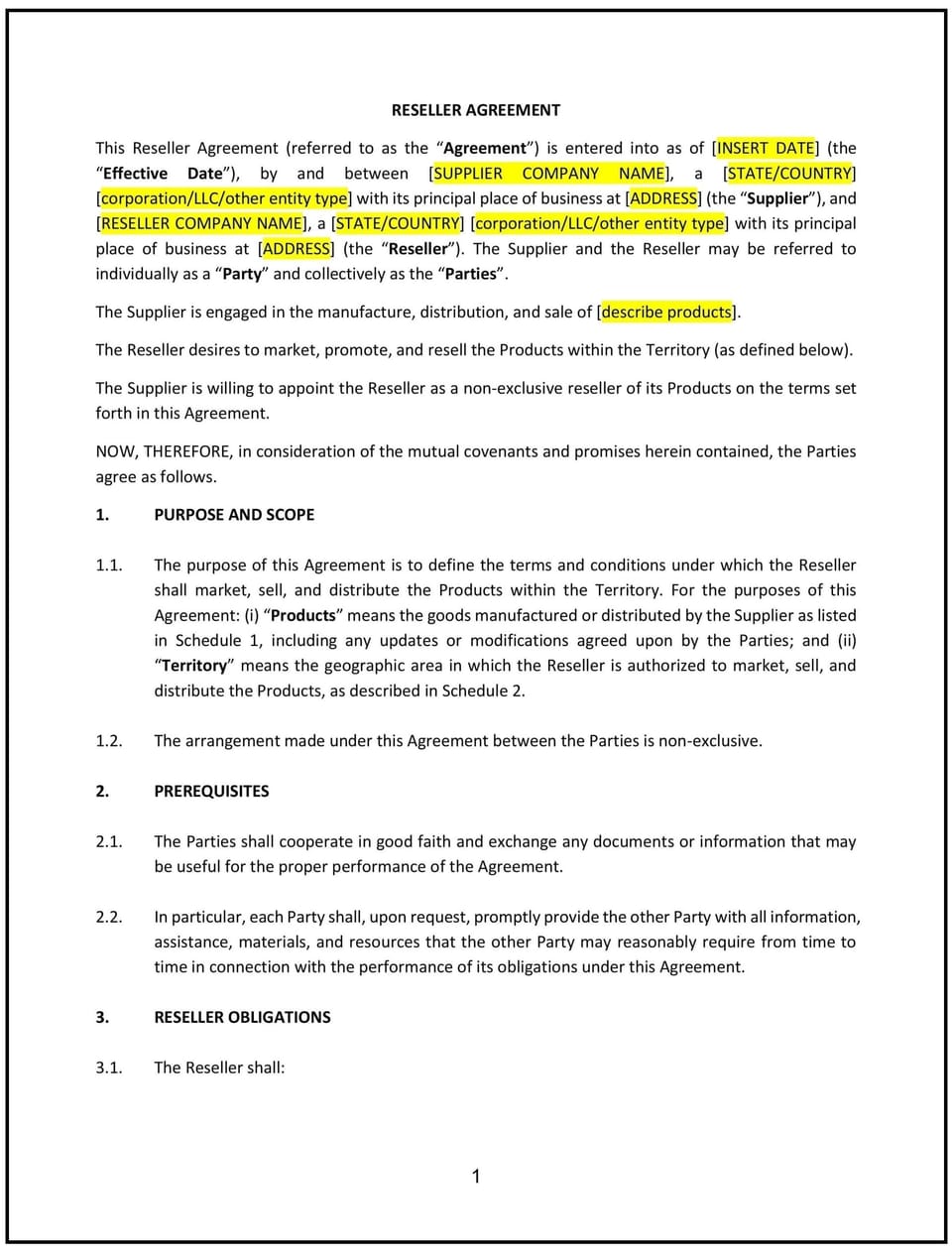Reseller Agreement (California): Free template

Reseller Agreement (California)
A Reseller Agreement is a legally binding contract between a supplier or manufacturer (the "Vendor") and a third-party reseller (the "Reseller") that outlines the terms under which the Reseller can sell the Vendor’s products or services. In California, Reseller Agreements are widely used across industries such as technology, retail, manufacturing, e-commerce, and software-as-a-service (SaaS). Given California’s robust regulatory environment, including its strict consumer protection laws, data privacy regulations (e.g., CCPA), and labor laws, it is critical to ensure that Reseller Agreements are meticulously drafted to comply with state-specific requirements.
For example, a San Francisco-based SaaS company might use a Reseller Agreement to authorize a local IT firm to sell its subscription-based software, while a Los Angeles-based fashion brand might partner with a boutique retailer to distribute its clothing line. A well-drafted Reseller Agreement ensures clarity on pricing, intellectual property rights, and compliance with California’s unique legal landscape.
Tips for drafting and maintaining a Reseller Agreement in California
- Define the relationship: Clearly specify that the Reseller is an independent contractor and not an employee or agent of the Vendor. This distinction is particularly important in California, where misclassification of workers can lead to significant penalties under Assembly Bill 5 (AB5) and other labor laws.
- Example: “The Reseller is an independent contractor and shall have no authority to bind the Vendor in any way.”
- Outline product details: Specify the products or services the Reseller is authorized to sell, including any limitations on exclusivity or geographic restrictions. If the agreement involves digital products, ensure compliance with California’s stringent data privacy laws, such as the California Consumer Privacy Act (CCPA).
- Example: “The Reseller is authorized to sell the Vendor’s products within the state of California and may not sell outside this territory without prior written consent.”
- Set pricing and payment terms: Detail how the Reseller will be compensated, whether through commissions, discounts, or other arrangements. Include payment schedules and invoicing procedures. Ensure transparency in pricing to comply with California’s Unfair Competition Law (UCL).
- Example: “The Reseller will receive a 20% discount on all products purchased from the Vendor and will remit payment within 30 days of invoice receipt.”
- Address intellectual property rights: Clarify ownership of trademarks, logos, and other intellectual property used by the Reseller. Ensure compliance with federal and California state laws regarding intellectual property, including licensing agreements and trademark usage.
- Example: “All trademarks and branding materials provided by the Vendor remain the sole property of the Vendor and must be used in accordance with the Vendor’s guidelines.”
- Include performance metrics: Establish minimum sales targets or performance expectations for the Reseller. This ensures accountability and aligns incentives. Performance metrics should be realistic and measurable to avoid disputes.
- Example: “The Reseller agrees to achieve a minimum monthly sales volume of $10,000 or risk termination of this agreement.”
- Specify termination clauses: Define the conditions under which the agreement can be terminated, such as breach of terms, failure to meet performance metrics, or mutual agreement. Include provisions for winding down the relationship, such as returning unsold inventory or ceasing use of intellectual property.
- Example: “Either party may terminate this agreement with 30 days’ written notice if the other party fails to fulfill its obligations.”
- Comply with California laws: Ensure the agreement adheres to California’s contract laws, including the California Uniform Commercial Code (UCC) for transactions involving goods. Additionally, address compliance with the CCPA, AB5, and other relevant statutes.
- Include dispute resolution mechanisms: Specify how disputes will be resolved, whether through arbitration, mediation, or litigation. California courts often favor alternative dispute resolution methods, so consider including an arbitration clause.
- Example: “Any disputes arising under this agreement shall be resolved through arbitration in Los Angeles, California.”
Frequently asked questions (FAQs)
Q: Is a Reseller Agreement legally binding in California?
A: Yes, as long as the agreement is clear, reasonable, and complies with California contract laws, it is enforceable. Including specific terms and signatures from both parties strengthens enforceability.
Q: What should a Reseller Agreement include in California?
A: It should include the scope of the relationship, product details, pricing and payment terms, intellectual property rights, performance metrics, termination clauses, compliance with California laws (e.g., CCPA, UCC), and dispute resolution mechanisms.
Q: Can a Reseller Agreement be terminated early in California?
A: Yes, if the agreement includes a termination clause, either party can terminate the document with reasonable notice. The terms should specify any conditions or procedures for termination.
Q: What industries commonly use Reseller Agreements in California?
A: Industries like technology, retail, manufacturing, e-commerce, and SaaS frequently use Reseller Agreements in California. For example, a tech company might use it to authorize a reseller to distribute its software.
Q: How can businesses ensure compliance with California laws in Reseller Agreements?
A: Businesses should ensure their agreements comply with California’s contract laws, including the CCPA, UCC, and AB5. Regularly reviewing and updating the agreement is also essential to maintain compliance.
This article contains general legal information and does not contain legal advice. Cobrief is not a law firm or a substitute for an attorney or law firm. The law is complex and changes often. For legal advice, please ask a lawyer.


